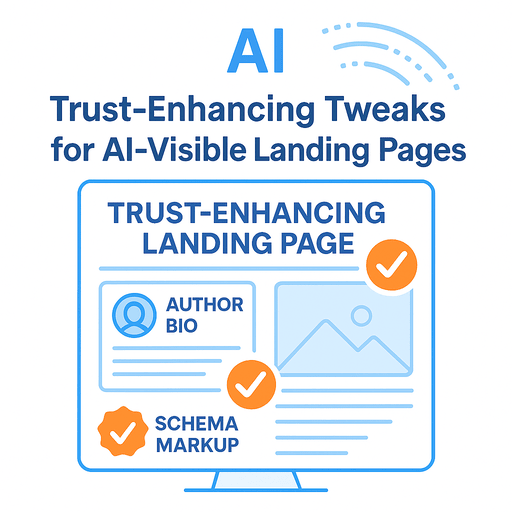Trust-Enhancing Tweaks for AI-Visible Landing Pages

Short Answer: AI-visible landing pages that earn visibility in generative search results focus on credibility first. The more trust signals your page offers through real data, transparent authorship, and clear design, the more likely AI systems are to feature or recommend it.
Introduction
Modern AI systems no longer just scan for keywords. They analyze whether users and algorithms can trust you.
That means your landing page must look, sound, and behave like a reliable expert source, not just another sales pitch. According to Google’s Helpful Content Guide, trust forms the foundation of E-E-A-T: Experience, Expertise, Authoritativeness, and Trustworthiness.
AI crawlers now weigh signals like factual accuracy, author identity, and visual consistency when deciding whether to quote or rank your content. In this post, we’ll explore subtle but powerful tweaks you can make to enhance credibility and build landing pages that perform well in AI-driven search environments.
Before We Begin: Why Trust Signals Matter
AI systems summarize millions of pages in seconds. When two pages say the same thing, the one that feels more verifiable wins.
Every headline, sentence, image, and link contributes to an algorithmic confidence score that affects whether your page appears in AI Overviews, Gemini results, or ChatGPT-powered search integrations.
9 Trust-Enhancing Tweaks
Let’s explore how to turn trust into your landing page’s competitive edge.
1. Align Your Headline and Subheads
Your headings act like evidence markers. When your H1, meta title, and H2s reinforce one another semantically, AI systems easily verify your topic’s consistency.
For example:
H1: Affordable Solar Installations Near You
H2: Why Local Solar Experts Provide the Best Value
These reinforce each other naturally without repeating keywords. Use action-driven headlines with social proof language, such as “See Why 1,000+ Homeowners Choose Us.” It signals authenticity and experience simultaneously.
2. Add Author and Entity Transparency
AI engines increasingly look for named authors and connected entities. Include:
-
A verified author bio with credentials or years of experience
-
Links to your LinkedIn profile or company About page
-
Clear business contact details
Generative engines extract these as trust cues, confirming there’s a real expert behind your claims. Even service pages benefit from this transparency because AI prefers attributed content over anonymous writing.
3. Replace Promotion with Proof
Empty claims like “we’re the best” or “trusted by thousands” don’t build confidence unless supported by data. Replace them with:
-
Case study snippets
-
Screenshots of testimonials
-
Verified statistics
In How to Optimize Content for AI Fact Coverage, I explain how AI models prefer fact-dense sources. The same rule applies here. Pages that present verifiable information signal credibility both to humans and to algorithms.
4. Verify Visual Consistency
AI now compares text and image alignment to evaluate truthfulness. An AI systems study found that factual confidence increases when imagery matches textual claims.
That means you should use authentic visuals, not stock photos that could belong to anyone. Include captions, alt text, or overlays that restate key facts (“Certified HVAC Team in San Diego,” “Real Customer Before & After”). Visual context builds subconscious trust faster than words alone.
5. Craft CTAs That Feel Safe to Click
Your calls-to-action can either amplify or erode trust. Instead of generic “Contact Us,” use intent-reinforcing phrases:
-
“Get a Verified Estimate”
-
“Schedule a Free Certified Demo”
-
“Compare Transparent Pricing Options”
Each phrase conveys clarity and reduces hesitation. AI models also interpret this as a semantic cue that your page offers secure next steps, not clickbait.
6. Use Schema and Metadata Strategically
Structured data isn’t just technical hygiene anymore. Schema tells AI what’s factual, who authored it, and how users interact with it. Add markup for:
-
Organization (name, logo, contact info)
-
Author or Person (especially for expert content)
-
Reviews (aggregate rating or testimonial schema)
These elements act like trust anchors, reinforcing your credibility across both traditional SERPs and AI summaries.
7. Expand FAQs for Answer Density
A good FAQ section does more than address user questions. It improves your page’s Answer Density, the number of distinct, verifiable responses within one URL.
As discussed in my blog Answer Density vs Keyword Density, AI systems prefer pages with clear, standalone answers they can extract confidently.
Each FAQ adds another opportunity for AI visibility, provided it’s concise, factual, and backed by experience or citations.
8. Simplify Design and Page Load
Trust can evaporate if your page feels clunky or slow. Keep layouts clean, colors cohesive, and imagery optimized. Pages that load under three seconds reduce bounce rates and subconsciously signal competence.
Avoid flashy animations or hard-to-read fonts. A professional visual hierarchy reassures users and AIs that your brand is organized and reliable.
9. Maintain Consistent Brand Voice
Your tone communicates just as much trust as your layout. Use confident, direct sentences and avoid exaggerated marketing buzzwords. Consistency across all landing pages strengthens your brand’s credibility footprint and helps AI link each property back to your verified entity.
FAQ: How Do I Know If My Page Feels Trustworthy?
Run a quick test:
-
Search your brand or offer in AI Overviews or ChatGPT search.
-
Note whether your page appears or if AI quotes a competitor instead.
-
Compare trust elements: authorship, visuals, CTAs, or schema markup.
The difference often lies not in optimization but in believability.
Conclusion: Build Trust Before You Build Traffic
Search is becoming more intelligent but also more skeptical. AI-visible landing pages that succeed are those built with proof, transparency, and clarity. When every design choice and word choice supports authenticity, visibility follows naturally.
If you’d like help transforming your landing pages into AI-visible, trust-optimized assets, contact me for a personalized SEO content audit. Let’s make your expertise something AI engines can’t ignore.

0 Comments Add a Comment?